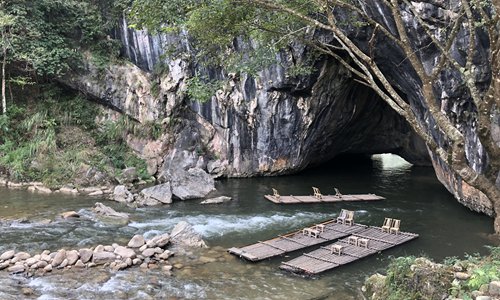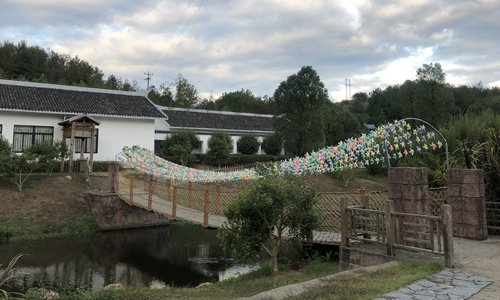HOME >> CHINA
Changting people turn bare mountains into national park
By Leng Shumei Source:Global Times Published: 2019/10/16 18:48:40

A picture taken on Tuesday shows Longmen Gorge, the starting point of the water rafting project in Anjie villiage, Changting, East China's Fujian Province. Photo: Leng Shumei/GT
In the 1940s, the area of soil erosion in Changting county, East China's Fujian Province, was nearly 1.5 million mu (1,000 square kilometers), covering one third of the county's land area.
However, after 70 years of efforts, the county has undergone a complete change, and little trace of the past can be seen.
According to the local government, the forest coverage rate in Changting has reached 80 percent this year, with 16.23 million square kilometers of forest and 275.35 square kilometers of nature reserve.
A 5.9-square kilometer national wetland park has also been established in the south of the county, in which more than 20,000 waxberry trees have been planted.
Changting also pulled itself out of poverty at the end of 2018. The average income of residents in seven towns that suffer the most from soil erosion has all reached or exceeded the average county level of 15,348 yuan ($2,162) per year, an increase of about 13 percent compared to 2011.
Given these achievements, the county has become one of the first 46 to be awarded the title of model county in ecological civilization construction and a trial base for the implementation of the concept of "clear water and green mountains are as precious as gold and silver" in September 2017.
Rebuild 'wasteland'
Changting started its journey to control and curb soil erosion as early as 1949 when the province set up a trial area of water and soil conservation in Hetian town, Changting.
In 1983, the county was listed as a provincial trial spot for controlling soil erosion.
The then deputy secretary of Fujian provincial Party committee and current Chinese President Xi Jinping visited the county in November 1999 and reported Changting to central authorities as a national key county in water and soil conservation.
Xi also approved financial support of 10 million yuan every year to the county for soil erosion control.
"The mountains were all barren hills without grass in 1999 and people were very poor at that time, and could only earn some money at the end of the year after selling their pigs," Lai Musheng, a fruit grower in Hongjiang village in Changting, told the Global Times on Tuesday.
Lai came to Hongjiang at the invitation of local leaders to help the village control soil erosion and get rid of poverty through fruit planting.
Lai used livestock excrement to improve the soil. He has also been giving classes to local farmers and students to share his experiences and techniques in fruit growing since 2000, the same year he was awarded the title of national advanced individual in developing wasteland resources.
Now, families that have learned fruit growing techniques from Lai and built their own farms can earn as much as 100,000 yuan per year, according to Lai.

A photo taken on Tuesday shows a bridge decorated with pinwheels at the Tingjiang National Wetland Park in south Changting, East China's Fujian Province. Photo: Leng Shumei/GT
Liao Yanshi, who has grown orchids in Sidu town of Changting for more than 30 years, was another example of someone using his own experience to help protect the environment while improving local lives.
"Local people used to cut and sell trees to make money, but now more and more people grow orchids as it is not only friendly to the environment, but also more profitable than cutting trees," Liao was quoted as saying by the Fujian Daily in January.
Local orchid growers can earn about 30,000 yuan per year, according to the report.
In addition to planting, local governments are also exploring tourism projects to make full use of local nature while protecting the water and mountains.
A 4.8-kilometer water rafting program located in Anjie village - the source of the Tingjiang river - is estimated to have brought 2 million yuan in income to local people from July to October.
A local resident surnamed Zhong said that while exploiting nature, they pay a great deal of attention to environmental protection. "Waste water will be collected and processed to a safe level before being drained into the river. Locals will also patrol the river to clean waste," he said.
The local government has invested 17.75 million yuan since 2012 to improve waste and sewage processing systems in Anjie. The water quality of the Tingjiang river has maintained national standards for many years.
Proud achievements
After the 2019 Nobel Prize was awarded to three economists in the US on Monday, discussion spread on Chinese social media that people working on the front line of poverty alleviation in China should receive the Nobel Economics Prize for lifting more than 850 million people out of extreme poverty and contributing to 70 percent of worldwide poverty reduction in the past 40 years.
However, Chinese analysts noted that China's biggest achievements on poverty alleviation are practical rather than academic.
Chinese people should be proud of China's poverty alleviation progress and continue the work with or without a Nobel Prize, they said.
Analysts were echoed by Lai who believed that life will get better as long as he works hard with or without governmental support.
"I am happy as long as the trees grow well and the fruits taste good," he said, noting that he would spare no efforts in reaching that goal.
"If I plant a new kind of fruit, I will do everything to make it successful," Lai said, standing in front of the tea-oil trees he plants, which are estimated to have produced 1,000 kilograms this year. The price of tea-oil tree fruit is about 40 yuan per kilogram.
Newspaper headline: Cherishing the environment